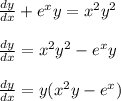
Mathematics, 11.02.2020 03:50 2002babygurl
Determine whether each first-order differential equation is separable, linear, both, or neither.
dy/dx + e^x y = x^2 y^2
y + sin x = x^3 y'
In x - x^2 y = xy'
dy/dx + cos y = tan x

Answers: 2


Another question on Mathematics

Mathematics, 21.06.2019 15:30
The local farm is advertising a special on fresh picked peaches. the farm charges $4.25 to pick your own peck of peaches and $3.50 for each additional peck you pick. write an equation for the total cost of peaches in terms of the number of pecks. deine your variables. how much does it cost to pick 3 pecks of peaches?
Answers: 3

Mathematics, 21.06.2019 19:20
The square root of 9x plus 7 plus the square rot of 2x equall to 7
Answers: 1

Mathematics, 21.06.2019 20:30
Write the summation to estimate the area under the curve y = 1 + x2 from x = -1 to x = 2 using 3 rectangles and right endpoints
Answers: 1

Mathematics, 21.06.2019 21:40
Which statement is true about a number and its additive inverse? a. their product is always one. b. their sum is always one. c. they are always reciprocals of each other. d. their sum is always zero.
Answers: 1
You know the right answer?
Determine whether each first-order differential equation is separable, linear, both, or neither.
Questions

Mathematics, 02.10.2020 09:01


History, 02.10.2020 09:01

History, 02.10.2020 09:01

SAT, 02.10.2020 09:01


Mathematics, 02.10.2020 09:01

Mathematics, 02.10.2020 09:01



Computers and Technology, 02.10.2020 09:01

Biology, 02.10.2020 09:01



Mathematics, 02.10.2020 09:01



Mathematics, 02.10.2020 09:01


History, 02.10.2020 09:01

 . It is not a first-order linear differential equation. And it's not separable either.
. It is not a first-order linear differential equation. And it's not separable either. . It is a first-order linear differential equation.
. It is a first-order linear differential equation. . It is a first-order linear differential equation.
. It is a first-order linear differential equation. . It is not a first-order linear differential equation. And it's not separable either.
. It is not a first-order linear differential equation. And it's not separable either.
 ,
,





